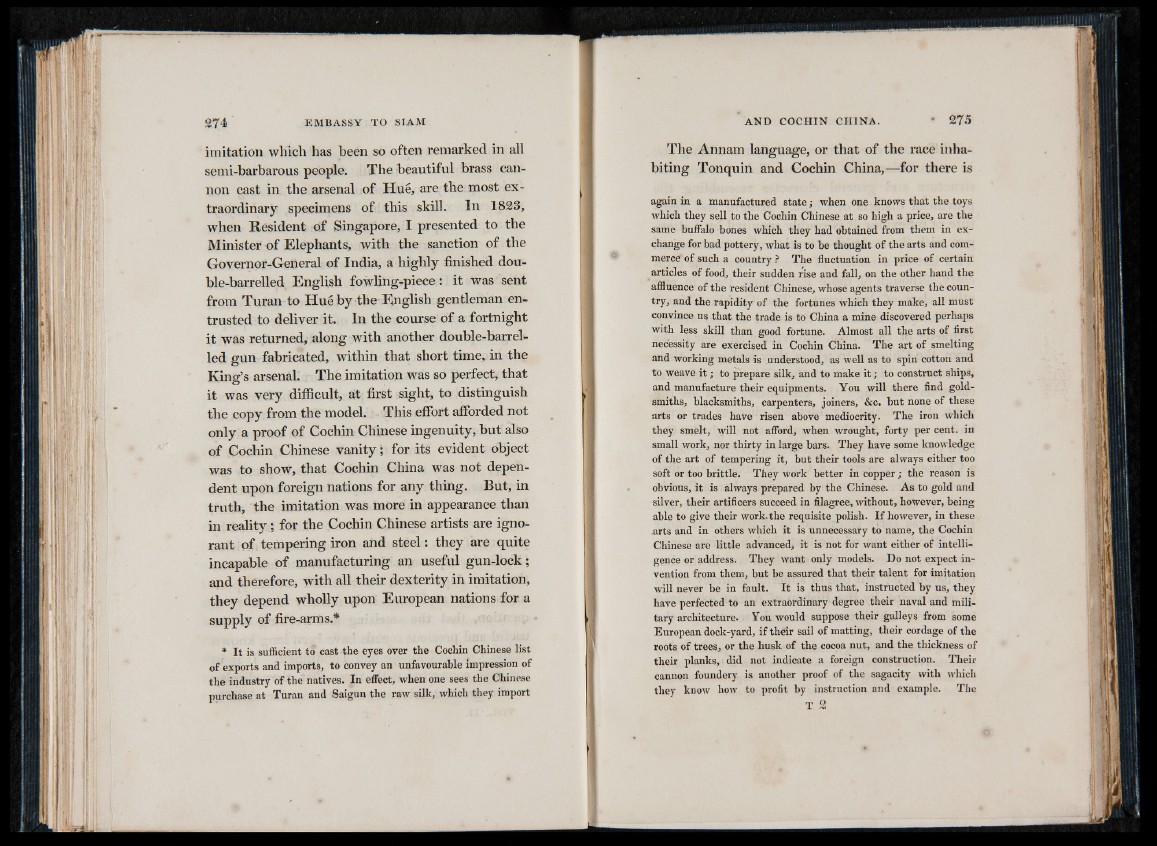
imitation which has been so often remarked in all
semi-barbarous people. The beautiful brass cannon
cast in the arsenal of Hue, are the most extraordinary
specimens of this skill. In 1823,
when Resident of Singapore, I presented to the
Minister of Elephants, with the sanction of the
Governor-General of India, a highly finished double
barrelled English fowling-piece : it was sent
from Turan to Hue by the English gentleman entrusted
to deliver it. In the course of a fortnight
it was returned, along with another double-barrelled
gun fabricated, within that short time, in the
King’s arsenal. The imitation was so perfect, that
it was very difficult, at first sight, to distinguish
the copy from the model. This effort afforded not
only a proof of Cochin Chinese ingenuity, but also
of Cochin Chinese vanity; for its evident object
was to show, that Cochin China was not dependent
upon foreign nations for any thing. But, in
truth, the imitation was more in appearance than
in reality ; for the Cochin Chinese artists are ignorant
of tempering iron and steel: they are quite
incapable of manufacturing an useful gun-lock;
and therefore, with all their dexterity in imitation,
they depend wholly upon European nations for a
supply of fire-arms.*
* It is sufficient to cast the eyes over the Cochin Chinese list
of exports and imports, to convey an unfavourable impression of
the industry of the natives. In effect, when one sees the Chinese
purchase at Turan and Saigun the raw silk, which they import
The Annam language, or that of the race inhabiting
Tonquin and Cochin China,—for there is
again in a manufactured state ; when one knows that the toys
which they sell to the Cochin Chinese at so high a price, are the
same buffalo bones which they had obtained from them in exchange
for bad pottery, what is to be thought of the arts and commerce
of such a country ? The fluctuation in price of certain
articles of food, their sudden rise and fall, on the other hand the
affluence of the resident Chinese, whose agents traverse the country,
and the rapidity of the fortunes which they make, all must
convince us that the trade is to China a mine discovered perhaps
with less skill than good fortune. Almost all the arts of first
necessity are exercised in Cochin China. The art of smelting
and working metals is understood, as well as to spin cotton and
to weave it ; to prepare silk, and to make it ; to construct ships,
and manufacture their equipments. You will there find goldsmiths,
blacksmiths, carpenters, joiners, Sec. but none of these
arts or trades have risen above mediocrity. The iron which
they smelt, will not afford, when wrought, forty per cent, in
small work, nor thirty in large bars. They have some knowledge
of the art of tempering it, but their tools are always either too
soft or too brittle. They work better in copper ; the reason is
obvious, it is always prepared by the Chinese. As to gold and
silver, their artificers succeed in filagree, without, however, being
able to give their work, the requisite polish. If however, in these
arts and in others which it is unnecessary to name, the Cochin
Chinese are little advanced, it is not for want either of intelligence
or address. They want only models. Do not expect invention
from them, but be assured that their talent for imitation
will never be in fault. It is thus that, instructed by us, they
have perfected to an extraordinary degree their naval and military
architecture. You would suppose their galleys from some
European dock-yard, if their sail of matting, their cordage of the
roots of trees, or the husk of the cocoa nut, and the thickness of
their planks, did not indicate a foreign construction. Their
cannon foundery is another proof of the sagacity with which
they know how to profit by instruction and example. The
T 2